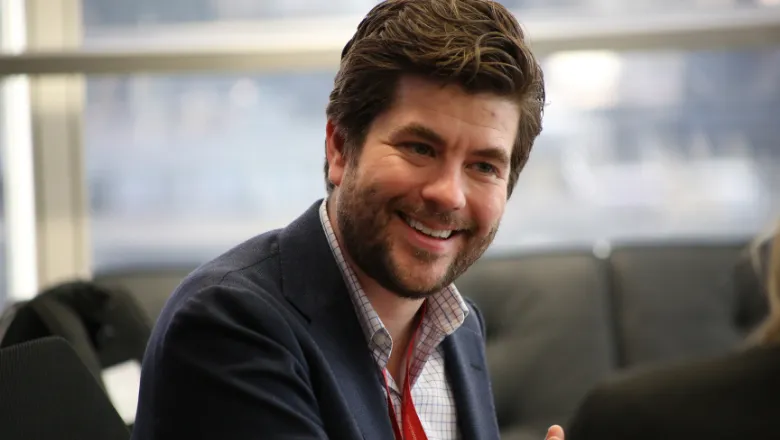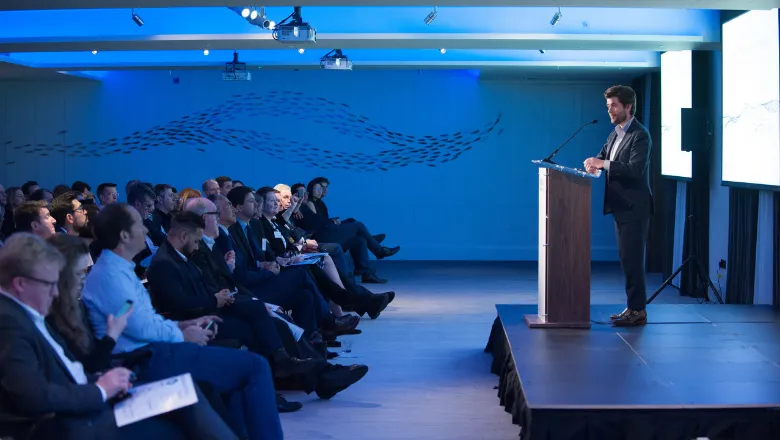Education for practitioners and patients is crucial. In our experience, when advances in technologies are developed outside of the appropriate patient engagement it loses a lot of value. We must advance analytics and AI with the appropriate care givers that can communicate with patients in a meaningful way to avoid this happening.
Dr Mark Michalski
21 March 2019
Data Science in healthcare: 5 questions with Mark Michalski
Katie Konyn, Communications Manager
Dr Mark Michalski, Executive Director of the MGW & BWH Center for Clinical Data Science (CCDS), joined us at King's to deliver the keynote presentation at the launch of the London Medical Imaging and AI Centre for Value-Based Healthcare in February. CCDS is pioneering new uses for AI and machine learning in healthcare and is is affiliated with Harvard University, Partners Healthcare and based in Boston, MA. We caught up with Mark to learn more about the future of data science in healthcare:

What would you say are the critical components needed to advance the use of AI in healthcare?
We often hear talk about data being the fuel for innovation in AI, but to make real progress I think it comes to down to people – outstanding engineers, expert clinicians and product developers with a fundamental understanding of how to turn these ideas into usable tools.
Beyond that, integrating AI solutions into hospitals so they can be used for healthcare on a daily basis is the ultimate goal for us at CCDS. AI is a disruptive force but it still is difficult to get it inserted meaningfully in to a doctor’s workflow, because the way that healthcare is delivered is so different across different specialties and different geographies.
For hospitals and care providers to find ways to adopt these technologies requires us to provide the tools for both integration and validation, such as simulations which can help us explore when things work and when we should question progress during development.
Which healthcare applications do you think will see the biggest changes?
We are already seeing the realities of AI adoption in diagnostic fields like radiology and pathology. That’s partly because what we know of AI today came from the computer vision community and image and video are really central to the practice of diagnostics. In these fields, AI is being used to improve the speed and accuracy in the interpretation of medical imaging exams, biopsies, and other parts of diagnostic medicine.
Looking forward, we’re now starting to see an evolution of the technology into population health, clinical informatics and hospital operations. As an example - from population health – AI can be used to “group” patients based on their health characteristics. This can help predict which patients are going to get sick sooner, which can prompt earlier intervention and help physicians decide which therapies to use.

What are the biggest challenges you face in translating the Centre’s work to clinical care?
I see the challenges as being split into technical hurdles and operational hurdles.
On the technical side, in the US and the UK, we often find a set of patchwork solutions and data silos that don’t always interact that well. Making data portable and accessible in way that ensures security yet preserves its usefulness for AI is the biggest barrier between us being able to really take advantage of this technology.
Operationally, this is a huge change management exercise requiring us to evolve the way we collect, store and make data available. Achieving this ultimately comes down to people - how they are educated, how they are trained, how they interact with data on a daily basis
What has been the biggest achievement for the Center for Clinical Data Science to date?
I could point to a number of machine learning models which will create significant impact on patient populations through change in practice of care for stroke, cardiovascular disease and paediatrics.
However, as mentioned, having the right mix of people is critical and it’s not always easy to bring together the variety of expertise needed to solve the challenges we face in healthcare and develop these into usable solutions.
That’s why our biggest achievement at CCDS is the team we’ve managed to establish, involving product development, industry relations, basic research and experienced clinicians, all with the same values and commitment to our work.
I see similarities with the teams here at King’s and the potential of us working together and what this could accomplish is huge.
Finally, any advice for our researchers and their future careers in this sector?
First, congratulations on making an unbelievably good decision by deciding to invest your time and energy in this challenging, but critical, space.
The best advice I can give is stressing the importance of having a cross-disciplinary team around as you grow your research portfolio and your network. This field presents such a complex set of problems that you’ll need people of all skill sets to your left and right as you develop and places like King’s provide the diversity needed to build that network.
